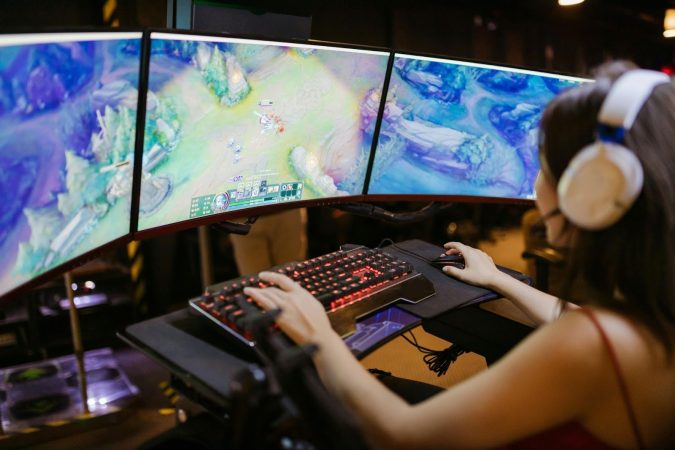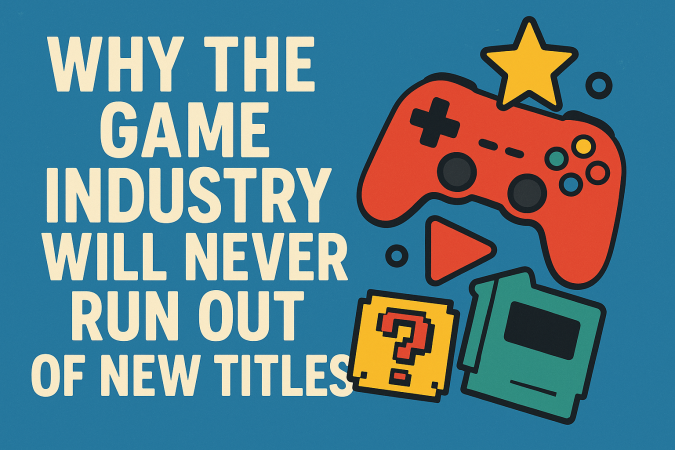Turn on any gaming platform and you’ll find dozens of new releases, some breaking new ground, others putting fresh spins on familiar ideas. This never-ending stream of games isn’t an accident. It’s what happens when you combine human creativity with constantly evolving technology and an audience that’s always hungry for something different.
Creativity Won’t Sit Still
Gaming runs on ideas. Big studios and tiny indie teams alike are all chasing that next spark, the mechanic, story, or world that’ll make people stop and pay attention. When they find it, the whole medium moves forward a little.
New technology doesn’t just make games look better. It opens doors nobody knew were there. Developers see new tools and immediately start wondering what they could build with them.
This restless energy shows up everywhere in digital entertainment. Online gaming especially has exploded in ways that surprise even industry veterans. For instance, as iGaming expert Joe Turner explains, the crash casino game has taken off in crypto circles because it’s fast-paced, unpredictable, and completely transparent. He notes that the standout platforms combine instant payouts with smart design and genuine fairness, delivering adrenaline rushes in seconds flat. That kind of innovative thinking, taking something straightforward and making it exciting, mirrors exactly what happens in mainstream game development.
Once something becomes standard, whether that’s sprawling open worlds, crafting mechanics, or movie-quality cutscenes, developers are already moving on to whatever’s next. The definition of “fun” never stops changing.
People Always Want Something New
Here’s the real reason games keep coming: we keep wanting them. Gamers are endlessly curious creatures. One week, everyone’s obsessed with relaxing farm sims. The next week it’s brutal horror games or competitive shooters. Trends shift fast, and the industry scrambles to keep up.
That’s partly why indie developers have had such a moment lately. Games like Hades and Celeste didn’t need massive budgets or celebrity voice actors. They just had heart and originality, and players responded immediately. When audiences want fresh experiences this badly, someone will always step up to deliver.
Tech Keeps Opening New Doors
Every technological leap creates possibilities that didn’t exist before. The shift from 2D to 3D games changed everything. Online multiplayer changed it again. Now we’re watching AI, augmented reality, and VR push boundaries we’re still figuring out.
Look at Pokémon GO, it turned ordinary walks into treasure hunts across real neighborhoods. Or Half-Life: Alyx, which showed VR could tell stories just as powerful as traditional games. Each breakthrough inspires another wave of experimentation. New tools mean new games. It’s really that straightforward.
Games Tell Our Stories Now
Somewhere along the way, games became more than just entertainment. They’ve turned into one of our most powerful storytelling mediums. Developers use them to dig into love, grief, identity, hope, all the stuff that makes us human.
The Last of Us explores what survival costs us. Life Is Strange examines friendship and consequences through time-travel weirdness. These aren’t just games, they’re emotional experiences that stick with you. As culture evolves, so do the stories we need to tell, which means there’s always room for new creative voices.

Competition Breeds Better Games
The gaming industry thrives on healthy rivalry. Everyone’s fighting for attention in an incredibly crowded market, and that pressure forces innovation. When one developer hits it big with a bold idea, everyone else tries to match it or do something even crazier.
You can watch this play out in real time across genres. Call of Duty might own the shooter space, but then Fortnite came along and added building mechanics and live concerts. Apex Legends responded with fluid movement and team-based abilities. Competition keeps everyone sharp and keeps players swimming in options.
Players Shape What Comes Next
Gamers aren’t just consumers anymore, they’re collaborators. Mods, fan projects, and community feedback regularly evolve into entirely new games. Some of the biggest titles in gaming history started as passion projects from players messing around.
Counter-Strike was a Half-Life mod. Dota 2 grew out of Warcraft III custom maps. Smart developers pay close attention to what fans are building because they know lightning might strike outside the studio. That back-and-forth between creators and community keeps things unpredictable in the best way.
Gaming Went Global
For years, gaming was dominated by developers from just a few countries. Not anymore. Now it’s a worldwide conversation, with studios from every continent bringing their own perspectives, traditions, and artistic styles.
Developers in Africa, South America, and Southeast Asia are making games that weave local folklore into modern gameplay. These diverse voices don’t just add variety, they fundamentally expand what gaming can be and ensure fresh perspectives keep flowing.
The Past Fuels the Future
Ironically, one of the biggest drivers of new games is our love for old ones. Nostalgia is powerful, but smart developers don’t just rehash the past, they reimagine it with modern sensibilities.
The Resident Evil and Final Fantasy VII remakes didn’t simply polish up old graphics. They rebuilt those games from the ground up for contemporary audiences. Even retro-inspired hits like Shovel Knight and Cuphead prove that looking backward can feel cutting-edge when you approach it thoughtfully.
What’s Coming Next
The future isn’t just about prettier visuals or faster processors. It’s about personalization. AI tools are already helping developers build worlds that respond to individual players, by adjusting dialogue, difficulty, even entire storylines based on how you play. Eventually, every playthrough might feel uniquely yours.
This technology is also democratizing development itself. Small teams and solo creators can now build ambitious worlds that used to require hundreds of people and massive budgets. That accessibility guarantees the pipeline of fresh ideas will never run dry.
Conclusion
Gaming isn’t just an industry, it’s a reflection of human imagination at its most playful. As long as technology advances, players dream bigger, and creators experiment fearlessly, the medium will keep expanding. Every new game builds on what came before while daring to try something different.
There’s no endpoint here. No final boss that marks the end of innovation. Just an endless stream of stories waiting to be played, worlds waiting to be explored, and ideas waiting to be tested. That’s not a bug, it’s the whole point.

